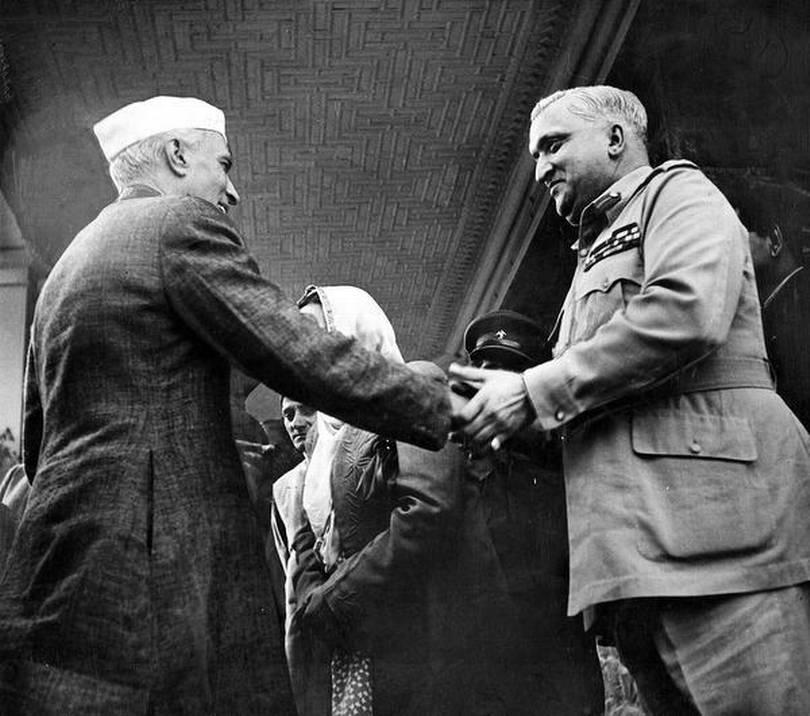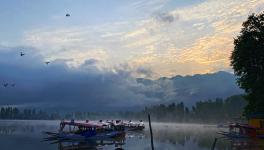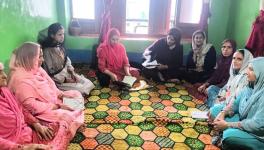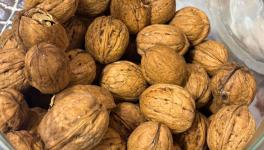The Ironic Death of Art 35A Will Haunt Kashmiri Pandits and India

The past of Article 35A has an irony crying out a warning from the grave in which it has been buried. The warning, in a nutshell, is that those perceived as outsiders are always resisted.
In January 1927, Hari Singh, a Dogra ruler whose dynastic predecessors styled themselves as Hindu, issued an order defining who in Jammu and Kashmir constituted state subjects. Only they, the order declared, could own property and be recruited in state services.
Hari Singh’s order wasn’t an example of imperious whimsy. His was a response to the popular pressure mounted on the Dogra rulers for three decades to ban outsiders, essentially Punjabis, from appropriating jobs in the higher echelons of the administration. Those who mounted pressure were the Hindus, principally Kashmiri Pandits, who had launched a movement “Kashmir for Kashmiris”.
In the feverish competition for jobs, Kashmiri Muslims were relatively late entrants, largely because they lagged behind other communities in education. Taking a cue from Pandits and Dogras – the two powerful groups in the state – Kashmiri Muslims subsequently organised themselves to leverage the idea of state subjects to their advantage.
On August 5, 2019, the ruling dispensation at the Centre read down Article 370 and abrogated Article 35A, which had been incorporated into the Indian Constitution through the Presidential Order of 1954. Article 35A had endorsed Hari Singh’s definition of state subjects and their rights.
The Bharatiya Janata Party is unabashedly Hindu in its identity, as were the Dogra rulers. Among the most enthusiastic cheerleaders celebrating the newly-gifted right of any Indian to purchase property are the Kashmiri Pandits, who had been the original advocates of the need to protect state subjects’ interests from the alleged rapacity of outsiders.
Indeed, Article 35A has met an ironic death.
The back-story of Article 35A dates to 1885, when Pratap Singh was crowned the third Dogra ruler after he accepted the colonial government’s condition to take a British Resident in his durbar and introduce administrative reforms.
In her magisterial work, Hindu Rulers, Muslim subjects, Mridu Rai writes, “...the Government of India made it clear that the Resident would have virtual carte blanche in Kashmir…” A slew of reforms was introduced in the Dogra state, among which a “modern and salaried bureaucracy manned by qualified individuals” was one.
Yet, in April 1889, Pratap Singh was stripped of his power. He was made the titular head of the state, the governance of which was to become the responsibility of the State Council. Its members were to be appointed by the colonial Indian government.
The late Prem Nath Bazaz, a politician and scholar who had a ringside view of the happenings in Kashmir in the late 1920s and thereafter, wrote in Inside Kashmir, “Almost immediately, when the maharaja was shorn of all his royal powers, the British Political Resident through the State Council began to interest himself in opening the different bureaus to make the administration look civilised and modern.”
With the Dogra state having no colleges, men with western education and training were brought in large numbers from the neighbouring province of Punjab. In 1889, the State Council substituted the Persian language with Urdu as the court language and also framed rules for holding competitive examinations for appointment to government service.
These measures had a disastrous impact on the Kashmiri Pandits, who had been manning the state administration until then. As Rai writes, “Having invested in their literacy in Persian for centuries in order to maintain their hold on power through state employment, they suddenly found the rug pulled from under their feet since few of them were fluent in Urdu.”
Most of the plum jobs were consequently assigned to Punjabis, who brought their relatives to fill vacancies in the state administration.
The turn in the fortunes of Kashmiri Pandits prompted them to make several representations to the Indian government. Courting them to bolster his own weakened position, Pratap Singh criticised the State Council in 1897, for filling the bureaucracy with outsiders at the expense of the natives of Kashmir and the Dogras.
His criticism presumably had the desired effect. In 1889, the Viceroy issued a letter to the Dogra durbar that mulkis, or natives, should be given preference over outsiders in jobs. But the problem was that there wasn’t a definition of mulkis. “Any outsider could call himself a Mulki by simply declaring himself to be one,” Bazaz pointed out.
The clamour against outsiders consequently did not subside. Rather, it continued to rise as the number of job-hunters among natives grew. This was fuelled largely because of the Sanatan Dharma Sabha—an organisation formed to promote social reforms among Kashmiri Pandits—establishing Pratap Hindu College in Srinagar to provide modern education. Another such college sprang up in Jammu.
Conscious of the popular pressure growing, Pratap Singh, whose powers had been restored in 1905, instituted a committee in 1912 to define state subjects. Rai cites from the committee’s report to say that the designation of state subjects included “all persons who had tendered a duly executed Rayat Nama and had acquired immovable property within the state territories.”
However, the definition also included all those persons who had been living in the state for at least 20 years. “In effect, the dominance of Punjabis was left securely in place since most of them had lived in the state for at least 20 years,” Rai writes.
In contrast to Kashmiri Pandits and Dogras, the Muslim elite’s focus was to overcome the educational backwardness of their community. In 1907, for instance, a group of “Representatives of Kashmiri Muslims” blamed Hindu officers for the community’s dismal educational attainment and its poor presence in the state bureaucracy. They wanted this anomaly to be addressed.
About the demand of Muslims, Bazaz wrote, “The cry of ‘down with the outsider’ was raised mostly by the Hindus. Sensible Muslims did not oppose it… Before taking any active part in it they wanted to make up the deficiency in the matter of education.”
Organisations outside Kashmir, however, interceded on behalf of its Muslim population. In 1912, the Muslim Kashmiri Conference of Lahore requested Pratap Singh that if Muslims in the state were not competent for employment, he should hire them from Punjab. Pratap Singh’s counter was that the 1912 definition of state subjects prohibited him from hiring employees from outside the state.
“Since this [the definition] had not prevented the employment of Punjabi Hindu officials, the ruler’s justification was regarded as a clear instance of the discrimination practised in Kashmir against Muslims,” Rai observes.
It wasn’t that the 1912 definition had satisfied the Kashmiri Pandits. For instance, Shankar Lal Kaul, a Pandit using the pseudonym of Kashmiricus, wrote in the United India and Indian States, “Kashmiris are treated as strangers in their own house.” He cited statistics culled from the civil and military lists to show that only 13 percent of state service jobs were with state subjects.
For good measure, Kashmiricus noted sarcastically, “By state subjects we mean the children of the soil of Jammu and Kashmir – whatever the state authorities may mean by it…”
Kashmiricus’ formulation was seen as a strategic manoeuvre to speak not just for Kashmiri Hindus, as they had been doing until then, but for all those residing in the state for generations. Another Kashmiri Pandit writing under the pseudonym Satis Superque wanted the term “state subjects” to include only those persons who were able to prove “hereditary residence” in the state for at least five generations.
All these ideas coalesced in the 1926 meeting of the Dogra Sabha, an organisation formed to promote social reforms among the Dogras, in Srinagar. Two hundred participants, largely comprising Dogras and Pandits but also a few Muslims, voted unanimously for giving preferential treatment in state service to “hereditary state subjects”. They wanted “hereditary state subjects” to include only those who had been residing in the state from the reign of the first Dogra ruler, Gulab Singh (1846-1856).
On the death of Pratap Singh in September 1925, Hari Singh succeeded him. On the basis of the State Subject Definition Committee’s report, Hari Singh issued an order on Jan 31, 1927 redefining state subjects.
According to this definition, Class I of state subjects included “all persons born and residing in the state before the commencement of the reign of Maharaja Gulab Singh and also all persons who settled therein before the commencement of 1885 and have since been permanently residing in the country.”
Class II consisted of persons who had settled in the state before the end of 1912. There were also Class III and Class IV of permanent residents. Class I was to have preference over Class II in state employment, and Class II over Class III and so on.
This was indeed a significant victory for the Kashmiri Pandits, whose support the Dogra ruler desperately required as a counterpoise against the growing political consciousness among Kashmiri Muslims. They, after all, constituted nearly 95% of the Valley’s and nearly 80% of the state’s population.
As state subjects, the Kashmiri Muslims had taken to demanding a preferential treatment in employment. Articulating this demand was a group of young Muslim men, who had been educated in Indian universities, and were known as the Reading Room Party, the name derived from the Muslim Reading Room where they would gather for political discussion. Among them was Sheikh Abdullah, who was to subsequently play a stellar role in Kashmir politics.
The demand for preferential treatment led to cracks in the regional solidarity that the Kashmir Pandits had forged. However, Bazaz, a Pandit himself, thought the demand of Muslims for preferential treatment was justified: “The policy of appointing only the hereditary state subjects did not help the Muslims… As soon as a vacancy occurred, state Hindus claimed it and got it on the basis of superior merit. For Muslims, therefore, no alternative was left but to demand a share on a strictly communal basis…”
Two views emerged among the Muslims regarding representation in state employment. The moderates wanted a fair representation, but did not specify what they meant by “fair”. The extremists insisted on representation in proportion to the population of Muslims. Aware of the paucity of educated Kashmiri Muslims, the extremists favoured recruitment of community members from Punjab. This could have undermined the very idea of hereditary state subjects.
Bazaz partly blamed the Hindus for the state employment issue taking a communal twist. He wrote, “Had they voluntarily agreed to allow a portion of the public services to Muslims at the very outset, perhaps the history of Kashmir would have been something entirely different from what it actually has been.”
The more the Hindus insisted on merit as the criterion for state service, the more the Muslims courted the extremists. “On the eve of the 1931 disturbances, an overwhelming majority of the Muslims had veered to this [extremist] viewpoint,” Bazaz recalled.
The Dogra Durbar turned down the demand of Muslims for reservation. A belligerent campaign was launched against Hari Singh. Rumours about Hari Singh’s mistreatment of Muslims and Islam spread. A chain of events led to Muslims attacking Hindus on July 13, 1931.
In October of that year, Hari Singh appointed a commission of inquiry under Bertrand J. Glancy. It recommended that minimum qualifications for employment in state service had to be fixed, but, at the same time, should not to be pitched unnecessarily high.
The Glancy Commission’s report was an admission that the grievance of Muslims regarding state employment wasn’t fictitious. It helped calm tempers. In subsequent years, as India hurtled towards Independence and the Dogra ruler vacillated on whether he should accede to India or Pakistan, Sheikh Abdullah sought to unite Muslims and Hindus by constructing the idea of Kashmiriyat.
What the past of Article 35A shows is that social stability gets imperilled by the entry of people into an area whose local population view them as outsiders. This becomes particularly acute when the outsiders acquire positions of power, as was the case with the Punjabis. This is why the Kashmiri Pandits took the lead in organising the people of Jammu and Kashmir against the Punjabis outsiders.
Ironically, it is the Pandits who are celebrating the demise of Article 35A. Their about-turn on the issue of state subjects and their privileges is linked to their exodus from the Valley because of the militant secessionist movement. A large percentage of them, understandably, turned hostile to the Kashmiri Muslims.
It is debatable whether the Kashmiri Pandits will return to the Valley anytime soon. Those who are celebrating think a self-consciously Hindu dispensation has taught their tormentors a lesson. Or those who still own properties there are rejoicing because they think their price will now rise.
But even before they return to a sullen and alienated Valley, land sharks and big businesses will covet the land of those who were, until August 5, hereditary state subjects. New ideas of “outsiders” and “insiders” (or state subjects) will emerge. Kashmiri Muslims will place among “outsiders” those segments of Kashmiri Pandits who no longer support the idea of state subjects. And the ghost of 35A will return to haunt them and India in the future.
Ajaz Ashraf is a freelance journalist based in Delhi. Views are personal.
Get the latest reports & analysis with people's perspective on Protests, movements & deep analytical videos, discussions of the current affairs in your Telegram app. Subscribe to NewsClick's Telegram channel & get Real-Time updates on stories, as they get published on our website.
























